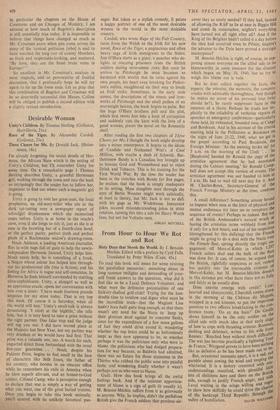From Hour to Hour We Rot and Rot
Sixty Days that Shook the World. By J. Benoist- Mechin. Edited with a preface by Cyril Falls.
Translated by Peter Wiles. (Cape, 45s.)
To read this book will mean for some reviving the painfullest memories: mooching about in long summer twilights and demanding of your- self frank answers to the questions, what did it feel like to be a Local Defence Volunteer, and what were the defensive potentialities of one hickory-shafted golf-club? Trying for the hun- dredth time to swallow and digest what must be the incredible truth—that the Maginot Line hadn't been built quite long enough, so that there wasn't any need for the Nazis to heap up their glorious dead against its concrete flanks, since for the expenditure of a few more gallons of fuel they could drive round it; wondering whether the top brass could be as bottomlessly inept as they now appeared to be, or whether perhaps it was the politicians only who were to blame, the politicians who had dodged prepara- tion for war because, as Baldwin had admitted, there was no future for those statesmen in the Thirties who rubbed the public nose into painful facts; and wondering finally whether it wasn't perhaps just us who were to blame.
Guilt. How this book brings all the awful feelings back. And if the insistent apportion- ment of blame is a sign of guilt (it usually is), M. Benoist-Mechin suffers from it as grievously as anyone. Why, he implies, didn't the perfidious British give the French soldiers that precious air-
THE SPECTATOR. APRIL 12, 1963 cover they so sorely needed? If they had, instead of allowing the RAF to lie at ease in Biggin Hill and comb its moustaches, mightn't everything have turned out all right after all? And if the King of the Belgians hadn't called it a day before the idea had occurred even to Main, mightn't the advance to the Dyle have proved a strategic masterpiece?
M. Benoist-Mechin is right, of course, in sup- posing almost everyone on the allied side to be blameworthy in some measure for the disaster which began on May 10, 1940, but to try to weigh this blame out is vain.
But he does collect together the fact's, the
reports, the minutes, the memoirs, the comptes- rendus with admirable thoroughness. And though he makes no secret of his personal bias (why should he?), he rarely suppresses facts in the interests of a thesis. Perhaps he trusts too jfll plicitly to the reliability of verbatim reports of speeches at emergency conferences—particularlY those held, by exhausted, hounded men, at Cange and Bordeaux. And in his account of the cruciai meeting held in the Prefecture at Bordeaux on the night of June 21-22, 1940, what we get Is the gospel according to Paul Baudouin, the Foreign Minister. 'As the meeting broke up' (at 3 a.m. on the morning of the 22nd) • • he [Baudouin] handed Sir Ronald the copy of the armistice agreement that he had annotated during the Cabinet meeting.' Sir Ronald Can't' bell does not accept this version of events. The armistice agreement was not handed to him at 3 a.m. He had to wait till next day for it. And M. Charles-Roux, Secretary-General of the French Foreign Ministry at the time, confirms this.
A small difference? Something almost bound
to happen when men at the limit of physical and mental endurance try later on to recapture tbe sequence of events? Perhaps so indeed. But out of the British Ambassador's natural wrath .at having the armistice terms withheld from huh if only for a few hours, and out of his suspict°11,s_ (strengthened by this dallying) that the French might be going to do a deal with the Nazis over the French fleet, sprang directly the tragic en- gagement off Mers-el-Kebir in which -1•29,. French sailors died and the bulk of the flee' was done for. It can, of course, be argued that the British, rightfully suspicious or not, rushed too quickly into the irrevocable violence 43,1 Mers-el-Kebir, but M. Benoist-Mechin doesn t in this instance put what facts there are as fullY and fairly as he usually does. Does anyone emerge with credit? Lion- hearted and idiosyncratic, Churchill comes doWtn in the morning at the Château du Wee; wrapped in a red kimono, to put the by-Trion, question to two officers breakfasting in the c°111 ference room: 'Oo ay ma bain?' De Gaul,_`!, shows himself to be the only soldier on the allied side with much idea at that early stage
, of how to cope with thrusting armour. Romnit' from
dashing and debonair, writes to his wife, Rennes: 'Reached here without much difficultyi The war has become practically a lightning Tout de France.' Weygand proves to have been nothi bn like as defeatist as he has been made out to 0. But, occasional moments apart, it is a sad, s'd
e
parable about sowing the wind and reaping th whirlwind. It is a history crammed with nt. understandings manifold, with plentiful bits of shiftiness here and there on the Brt_ittstb side, enough to justify French anger, and w er Laval waiting in the wings willing arid lot to show how skilfully he could drive the cha
of y of ti
fallethebhanukmriulipaotTnh.ird Republic through the
DAVID WILLIAM


































 Previous page
Previous page